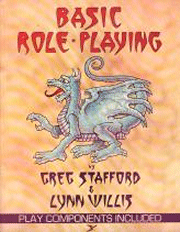
Basic Role-Playing (BRP) is a tabletop role-playing game which originated in the RuneQuest fantasy role-playing game. Chaosium released the BRP standalone booklet in 1980 in the boxed set release of the second edition of RuneQuest. Greg Stafford and Lynn Willis are credited as the authors. Chaosium used the percentile skill-based system as the basis for most of their games, including Call of Cthulhu, Stormbringer, and Elfquest.

Call of Cthulhu is a horror fiction role-playing game based on H. P. Lovecraft's story of the same name and the associated Cthulhu Mythos. The game, often abbreviated as CoC, is published by Chaosium; it was first released in 1981 and is in its seventh edition, with licensed foreign language editions available as well. Its game system is based on Chaosium's Basic Role-Playing (BRP) with additions for the horror genre. These include special rules for sanity and luck.

RuneQuest is a fantasy tabletop role-playing game originally designed by Steve Perrin, Ray Turney, Steve Henderson, and Warren James, and set in Greg Stafford's mythical world of Glorantha. It was first published in 1978 by The Chaosium. Beginning in 1984, publication passed between a number of companies, including Avalon Hill, Mongoose Publishing, and The Design Mechanism, before finally returning to Chaosium in 2016. RuneQuest is notable for its system, designed around percentile dice and an early implementation of skill rules, which became the basis for numerous other games. There have been several editions of the game.

The Ringworld science fiction role-playing game was published by Chaosium in 1984, using the Basic Role-Playing system for its rules and Larry Niven's Ringworld novels as a setting.
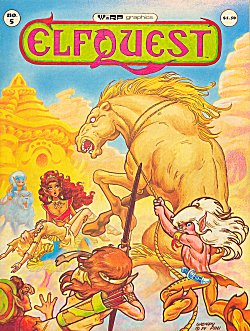
Elfquest is a comic book property created by Wendy and Richard Pini in 1978. It is a fantasy story about a community of elves and other fictional species who struggle to survive and coexist on a primitive Earth-like planet with two moons. Several published volumes of prose fiction also share the same setting. Elfquest was one of the first comic book series to have a planned conclusion. Over the years Elfquest has been self-published by the Pinis through their own company Warp Graphics, then Marvel Comics, then the Pinis again, more recently DC Comics, and, since 2013, Dark Horse Comics. All issues of Elfquest published prior to 2014 are available online for free.
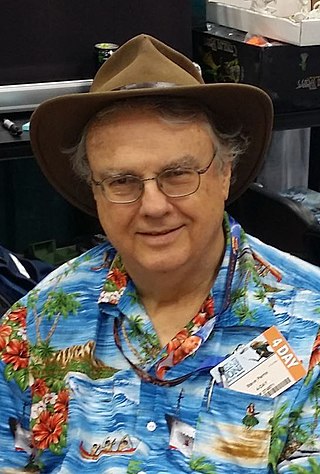
Stephen Herbert Perrin was an American game designer and technical writer/editor, best known for creating the tabletop role-playing game RuneQuest for Chaosium.
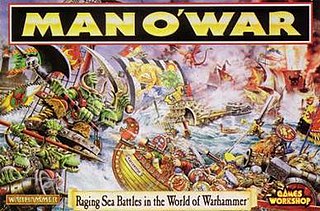
Man O' War is a now out-of-print table top war game by Games Workshop. The game was set in the same realm of Warhammer Fantasy as used for the Warhammer Fantasy Battle and included most of the factions from that setting. Other races of the Warhammer world were not included, either because they were lacking seafaring abilities, missing from the main factions at that time, or both.

Wendy PininéeFletcher, and Richard Pini are the husband-and-wife team responsible for creating the well-known Elfquest series of comics, graphic novels and prose works. They are also known as WaRP.

The Palladium Fantasy Role-Playing Game is a game produced by Palladium Books. It is set in the Palladium world some 10,000 years after a great war between the elves and dwarves. First published in July 1983 as The Palladium Role-Playing Game, the Palladium Fantasy Role-Playing Game saw a second edition in April 1996. The two are largely compatible, though the second edition uses a later iteration of Palladium's ruleset to be more compatible with the rest of their Megaverse.

The elf is a humanoid race in the Dungeons & Dragons fantasy role-playing game, one of the primary races available for player characters, and play a central role in the narratives of many setting worlds of the game. Elves are renowned for their grace and mastery of magic and weapons such as the bow and sword. Becoming physically mature by the age of 25 and emotionally mature at around 125, they are also famously long-lived, capable of living more than half a millennium and remaining physically youthful. Possessed of innate beauty and easy gracefulness, they are viewed as both wondrous and haughty by other races; however, their natural detachment is seen by some as introversion or xenophobia. They were usually antagonistic towards dwarves.
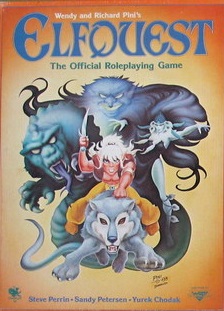
Elfquest is a tabletop role-playing game published by Chaosium in 1984. Based on Wendy and Richard Pini's Elfquest series of comics, this Basic Role-Playing game was written by Steve Perrin, Sandy Petersen, and Yurek Chodak.
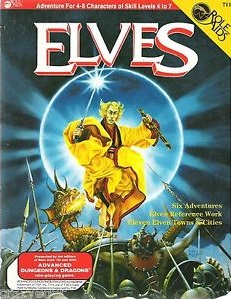
Elves is a supplement for fantasy role-playing games published by Mayfair Games in 1983.
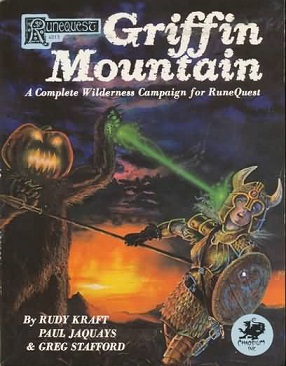
Griffin Mountain is a tabletop role-playing game supplement for RuneQuest, written by Rudy Kraft, Jennell Jaquays, and Greg Stafford, and published by Chaosium in 1981. Griffin Mountain is a wilderness campaign setting for the RuneQuest system, focussed on the land of Balazar and the Elder Wilds. It contains role-playing material to help gamemasters design adventures in the setting. It received positive reviews in game periodicals including Ares, White Dwarf, The Space Gamer, and Dragon.
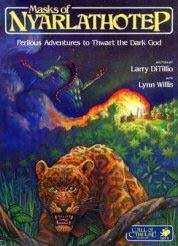
Masks of Nyarlathotep, subtitled Perilous Adventures to Thwart the Dark God, is an adventure campaign first published by Chaosium in 1984 for the second edition of the horror role-playing game Call of Cthulhu. A number of revised editions have subsequently been published. Masks of Nyarlathotep is a series of several sequential adventures set in the 1920s that take the player characters from New York, to London, Cairo, Nairobi, and Shanghai as they deal with the threat of the god Nyarlathotep. Screenwriter Larry DiTillio wrote the adventure with game designer Lynn Willis during a writer's strike. It received positive reviews in game periodicals including Casus Belli, The Space Gamer, White Dwarf, Different Worlds, and Dragon, and is considered to be one of the best roleplaying adventures of all time.

Alone Against the Dark, subtitled "Defying the Triumph of the Ice", is an adventure published by Chaosium in 1985 for the Horror tabletop role-playing game based on the works of H.P. Lovecraft, Call of Cthulhu. It was written by author Matthew J. Costello, and was the is the second Call of Cthulhu solo adventure published after Alone Against the Wendigo. The adventure received positive reviews in game periodicals including White Dwarf, Different Worlds, and Space Gamer/Fantasy Gamer. Chaosium published a revised edition of the adventure in 2017.

Cthulhu by Gaslight is a horror tabletop role-playing supplement, written by William A. Barton, with art by Kevin Ramos, and first published by Chaosium in 1986. This supplement provides information on role-playing in an alternate setting of Victorian England of the 1890s for Call of Cthulhu. An expanded second edition was published in 1988, and a third edition was published in 2012. It won an Origins Award and received positive reviews in game periodicals including White Dwarf, Casus Belli, Different Worlds, Space Gamer/Fantasy Gamer, The Games Machine, Games International, and Dragon.
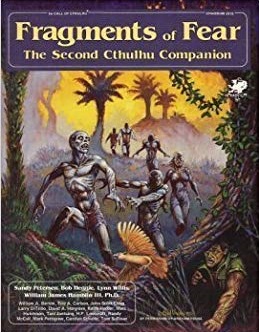
Fragments of Fear: The Second Cthulhu Companion is a 1985 role-playing game supplement for Call of Cthulhu, published by Chaosium.

Griffin Island is a boxed tabletop role-playing game supplement for RuneQuest. Originally published by Chaosium in 1981 as Griffin Mountain, a set of adventures set in the world of Glorantha, this edition was published in 1986 by The Avalon Hill Game Company as part of its third edition RuneQuest rules set. It was written by Rudy Kraft, Jennell Jaquays, Greg Stafford, and Sandy Petersen. Griffin Island contained role-playing material to help gamemasters design adventures in the setting. It received positive reviews in game periodicals including Casus Belli, White Dwarf, Dragon, Space Gamer/Fantasy Gamer, The Games Machine, and Games International.
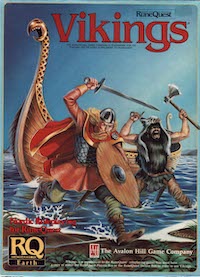
Vikings, Nordic Roleplaying for RuneQuest is a boxed tabletop role playing game supplement, written by Greg Stafford and Sandy Petersen, with a cover by Steve Purcell. Published under license by Avalon Hill in 1985 for Chaosium's fantasy role-playing game RuneQuest.

Send in the Clones is an adventure written by Allen Varney and Warren Spector, published in 1985 by West End Games for the light-hearted science-fiction role-playing game Paranoia. It was written by Allen Varney and Warren Spector, and consists of three short adventure scenarios involving the broadcasting star Teela O'Malley. It received positive reviews in game periodicals including White Dwarf, Casus Belli, and Different Worlds.




















